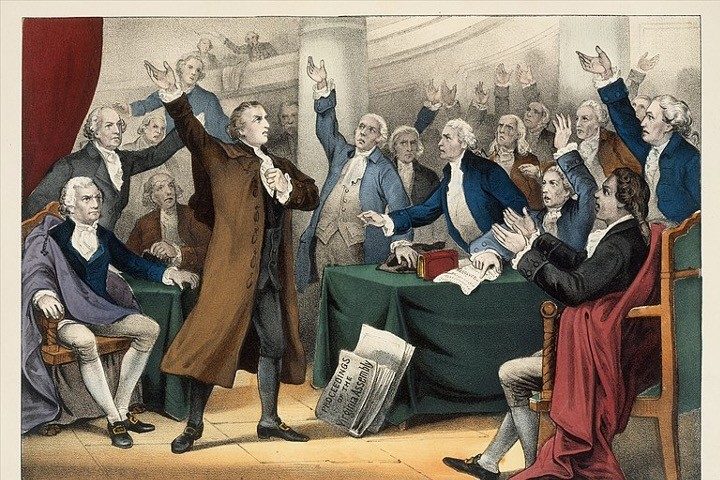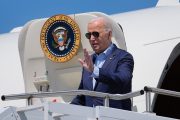
Generations of his countrymen have celebrated Patrick Henry for his rousing calls to arms.
Henry became one of the first of the Founding Fathers to call for independence and face head-on the punishments promised by the king for anyone taking such a stance. Undaunted by such threats, Henry fearlessly defended the right of man to be self-governing and free from the oppression of tyrants.
Biographer Harlow Unger describes Henry’s critical role in the American Colonies’ fight to restore their independence:
Patrick Henry is all but forgotten as the first of the Founding Fathers to call for independence, for revolution against Britain, for a bill of rights, and for as much freedom as possible from government — American as well as British. If Washington was the “Sword of the Revolution” and Jefferson “the Pen,” Patrick Henry more than earned his epithet as “the Trumpet” of the Revolution for rousing Americans to arms in the Revolutionary War.
Patrick Henry’s most oft-quoted renunciation of English despotism and reminder of the rights of Americans was delivered 248 years ago. On March 23, 1775, Henry implored his fellow Virginians to take up arms not in revolution against a legitimate government, but to restore the rights of all Englishmen to have a say in the laws made to govern them.
Arising to address his fellow delegates at the Virginia Convention, Patrick Henry stood in St. John’s Church in Richmond, aware that Virginia’s support for the war against Great Britain was in great part dependent on his ability to once again ignite the fire of resistance in the Old Dominion.
Sitting among the assemblage of notable burgesses were the aforementioned George Washington and Thomas Jefferson, the latter of whom reported that Henry’s declaration “had produced a great effect, and I myself had been highly delighted and moved.”
Patrick Henry began by presenting several resolutions that would put the Colony of Virginia “into a posture of defense … embodying, arming, and disciplining such a number of men as may be sufficient for that purpose.” As an earlier measure had passed by a very narrow margin, Henry delivered this speech before a vote was taken, imploring his colleagues to support the supply of troops and materiel for the fight for freedom.
Speaking without any notes and with a clamorous crescendo in his voice, Henry concluded his speech with the words that still swell the hearts of those engaged in the war on tyranny.
There is so much heat and so much fire in this ardent advocate’s defense of freedom and call to arms that no restatement would suffice. Therefore, here are substantial selections from the text of that famous oration as reported by early Patrick Henry biographer William Wirt in 1816:
Mr. President, it is natural to man to indulge in the illusions of hope. We are apt to shut our eyes against a painful truth, and listen to the song of that siren, till she transforms us into beasts. Is this the part of wise men, engaged in a great and arduous struggle for liberty? Are we disposed to be of the number of those who, having eyes, see not, and having ears, hear not, the things which so nearly concern their temporal salvation?
For my part, whatever anguish of spirit it may cost, I am willing to know the whole truth — to know the worst and to provide for it. I have but one lamp by which my feet are guided; and that is the lamp of experience. I know of no way of judging of the future but by the past.…
We have held the subject up in every light of which it is capable; but it has been all in vain. Shall we resort to entreaty and humble supplication? What terms shall we find which have not been already exhausted? Let us not, I beseech you, sir, deceive ourselves longer….
Our petitions have been slighted; our remonstrances have produced additional violence and insult; our supplications have been disregarded; and we have been spurned, with contempt, from the foot of the throne. In vain, after these things, may we indulge the fond hope of peace and reconciliation. There is no longer any room for hope.
If we wish to be free — if we mean to preserve inviolate those inestimable privileges for which we have been so long contending — if we mean not basely to abandon the noble struggle in which we have been so long engaged, and which we have pledged ourselves never to abandon until the glorious object of our contest shall be obtained, we must fight! I repeat it, sir, we must fight! An appeal to arms and to the God of Hosts is all that is left us!…
The battle, sir, is not to the strong alone; it is to the vigilant, the active, the brave. Besides, sir, we have no election. If we were base enough to desire it, it is now too late to retire from the contest. There is no retreat but in submission and slavery! Our chains are forged! Their clanking may be heard on the plains of Boston! The war is inevitable — and let it come! I repeat it, sir, let it come!
It is in vain, sir, to extenuate the matter. Gentlemen may cry, “Peace! Peace!” — but there is no peace. The war is actually begun! The next gale that sweeps from the north will bring to our ears the clash of resounding arms! Our brethren are already in the field! Why stand we here idle? What is it that gentlemen wish? What would they have? Is life so dear, or peace so sweet, as to be purchased at the price of chains and slavery? Forbid it, Almighty God!
I know not what course others may take; but as for me, give me liberty, or give me death!
Are Patrick Henry’s warnings and observations as true today as they were 248 years ago? Has the war already begun? Have our petitions been ignored? Are we headed toward absolute tyranny and unending slavery?
We, the heirs of such undaunted bravery, must raise the clarion call. We must remind our countrymen that safety is not the goal of freedom.
May we honor Patrick Henry’s memory and not permit our elected representatives to demand our liberty in exchange for their illusory promise of safety.



